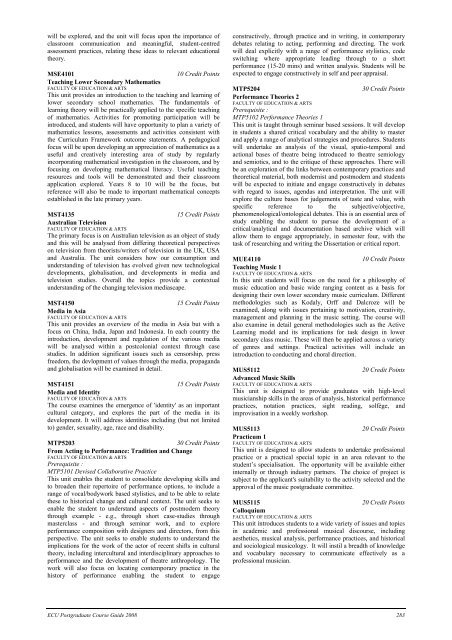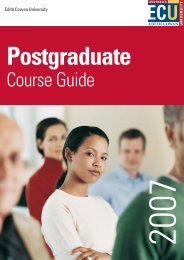Postgraduate - Edith Cowan University
Postgraduate - Edith Cowan University
Postgraduate - Edith Cowan University
You also want an ePaper? Increase the reach of your titles
YUMPU automatically turns print PDFs into web optimized ePapers that Google loves.
will be explored, and the unit will focus upon the importance of<br />
classroom communication and meaningful, student-centred<br />
assessment practices, relating these ideas to relevant educational<br />
theory.<br />
MSE4101 10 Credit Points<br />
Teaching Lower Secondary Mathematics<br />
FACULTY OF EDUCATION & ARTS<br />
This unit provides an introduction to the teaching and learning of<br />
lower secondary school mathematics. The fundamentals of<br />
learning theory will be practically applied to the specific teaching<br />
of mathematics. Activities for promoting participation will be<br />
introduced, and students will have opportunity to plan a variety of<br />
mathematics lessons, assessments and activities consistent with<br />
the Curriculum Framework outcome statements. A pedagogical<br />
focus will be upon developing an appreciation of mathematics as a<br />
useful and creatively interesting area of study by regularly<br />
incorporating mathematical investigation in the classroom, and by<br />
focusing on developing mathematical literacy. Useful teaching<br />
resources and tools will be demonstrated and their classroom<br />
application explored. Years 8 to 10 will be the focus, but<br />
reference will also be made to important mathematical concepts<br />
established in the late primary years.<br />
MST4135 15 Credit Points<br />
Australian Television<br />
FACULTY OF EDUCATION & ARTS<br />
The primary focus is on Australian television as an object of study<br />
and this will be analysed from differing theoretical perspectives<br />
on television from theorists/writers of television in the UK, USA<br />
and Australia. The unit considers how our consumption and<br />
understanding of television has evolved given new technological<br />
developments, globalisation, and developments in media and<br />
television studies. Overall the topics provide a contextual<br />
understanding of the changing television mediascape.<br />
MST4150 15 Credit Points<br />
Media in Asia<br />
FACULTY OF EDUCATION & ARTS<br />
This unit provides an overview of the media in Asia but with a<br />
focus on China, India, Japan and Indonesia. In each country the<br />
introduction, development and regulation of the various media<br />
will be analysed within a postcolonial context through case<br />
studies. In addition significant issues such as censorship, press<br />
freedom, the devlopment of values through the media, propaganda<br />
and globalisation will be examined in detail.<br />
MST4151 15 Credit Points<br />
Media and Identity<br />
FACULTY OF EDUCATION & ARTS<br />
The course examines the emergence of 'identity' as an important<br />
cultural category, and explores the part of the media in its<br />
development. It will address identities including (but not limited<br />
to) gender, sexuality, age, race and disability.<br />
MTP5203 30 Credit Points<br />
From Acting to Performance: Tradition and Change<br />
FACULTY OF EDUCATION & ARTS<br />
Prerequisite :<br />
MTP5101 Devised Collaborative Practice<br />
This unit enables the student to consolidate developing skills and<br />
to broaden their repertoire of performance options, to include a<br />
range of vocal/bodywork based stylistics, and to be able to relate<br />
these to historical change and cultural context. The unit seeks to<br />
enable the student to understand aspects of postmodern theory<br />
through example - e.g., through short case-studies through<br />
masterclass - and through seminar work, and to explore<br />
performance composition with designers and directors, from this<br />
perspective. The unit seeks to enable students to understand the<br />
implications for the work of the actor of recent shifts in cultural<br />
theory, including intercultural and interdisciplinary approaches to<br />
performance and the development of theatre anthropology. The<br />
work will also focus on locating contemporary practice in the<br />
history of performance enabling the student to engage<br />
constructively, through practice and in writing, in contemporary<br />
debates relating to acting, performing and directing. The work<br />
will deal explicitly with a range of performance stylistics, code<br />
switching where appropriate leading through to a short<br />
performance (15-20 mins) and written analysis. Students will be<br />
expected to engage constructively in self and peer appraisal.<br />
MTP5204 30 Credit Points<br />
Performance Theories 2<br />
FACULTY OF EDUCATION & ARTS<br />
Prerequisite :<br />
MTP5102 Performance Theories 1<br />
This unit is taught through seminar based sessions. It will develop<br />
in students a shared critical vocabulary and the ability to master<br />
and apply a range of analytical strategies and procedures. Students<br />
will undertake an analysis of the visual, spatio-temporal and<br />
actional bases of theatre being introduced to theatre semiology<br />
and semiotics, and to the critique of these approaches. There will<br />
be an exploration of the links between contemporary practices and<br />
theoretical material, both modernist and postmodern and students<br />
will be expected to initiate and engage constructively in debates<br />
with regard to issues, agendas and interpretation. The unit will<br />
explore the culture bases for judgements of taste and value, with<br />
specific reference to the subjective/objective,<br />
phenomenological/ontological debates. This is an essential area of<br />
study enabling the student to pursue the development of a<br />
critical/analytical and documentation based archive which will<br />
allow them to engage appropriately, in semester four, with the<br />
task of researching and writing the Dissertation or critical report.<br />
MUE4110 10 Credit Points<br />
Teaching Music 1<br />
FACULTY OF EDUCATION & ARTS<br />
In this unit students will focus on the need for a philosophy of<br />
music education and basic wide ranging content as a basis for<br />
designing their own lower secondary music curriculum. Different<br />
methodologies such as Kodaly, Orff and Dalcroze will be<br />
examined, along with issues pertaining to motivation, creativity,<br />
management and planning in the music setting. The course will<br />
also examine in detail general methodologies such as the Active<br />
Learning model and its implications for task design in lower<br />
secondary class music. These will then be applied across a variety<br />
of genres and settings. Practical activities will include an<br />
introduction to conducting and choral direction.<br />
MUS5112 20 Credit Points<br />
Advanced Music Skills<br />
FACULTY OF EDUCATION & ARTS<br />
This unit is designed to provide graduates with high-level<br />
musicianship skills in the areas of analysis, historical performance<br />
practices, notation practices, sight reading, solfège, and<br />
improvisation in a weekly workshop.<br />
MUS5113 20 Credit Points<br />
Practicum 1<br />
FACULTY OF EDUCATION & ARTS<br />
This unit is designed to allow students to undertake professional<br />
practice or a practical special topic in an area relevant to the<br />
student’s specialisation. The opportunity will be available either<br />
internally or through industry partners. The choice of project is<br />
subject to the applicant's suitability to the activity selected and the<br />
approval of the music postgraduate committee.<br />
MUS5115 20 Credit Points<br />
Colloquium<br />
FACULTY OF EDUCATION & ARTS<br />
This unit introduces students to a wide variety of issues and topics<br />
in academic and professional musical discourse, including<br />
aesthetics, musical analysis, performance practices, and historical<br />
and sociological musicology. It will instil a breadth of knowledge<br />
and vocabulary necessary to communicate effectively as a<br />
professional musician.<br />
ECU <strong>Postgraduate</strong> Course Guide 2008 283



